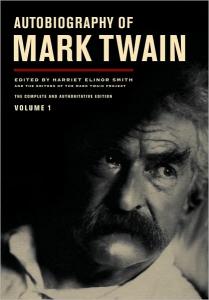Berkeley Books: The Autobiography of Mark Twain, vol. 1

Last fall, UC Press released the long-awaited first volume of the Autobiography of Mark Twain to great fanfare, and the book quickly outstripped its initial press run of 7,500 by several orders of magnitude. This runaway success was one of the great stories of the literary season—a surprise, it would seem to virtually everyone but the deceased author himself, who predicted that the book would “live a couple of thousand years without any effort.”
And while we’re only a few months into its first millennium, the 500,000-word book has achieved phenomenon status and received no shortage of critical attention (for a sense of the range of reviews, compare Andrew Delbanco’s take inThe New York Review of Books with Garrison Keillor’s for The New York Times). At Berkeley Books, rather than adding another voice to an already crowded critical conversation, we hope—as always—to bring readers a little more insight into the fascinating process behind academic publication. In the case of Twain’sAutobiography, that process was a uniquely mammoth editorial undertaking by the scholar-editors of the Mark Twain Project at the Bancroft Library.
As Robert Hirst, director of the Project, explained in an interview with NPR last December, the materials of the autobiography have been around and available to scholars for decades. The major obstacle to publication—aside from Twain’s famous demand that the book not be published until 100 years after his death—was the basic fact that no one knew quite how to craft an authoritative version from what seemed to be a veritable mountain of fragments, false starts, and endless digressions. The situation was something like that of Scheherazade’s One Thousand and One Nights in reverse: rather than making a story into a thousand tales, Mark Twain’s editors needed to spin his thousand tales into a single story. Previous versions of the autobiography had been attempted and published, but the results had been disappointing.
The scholar-editors at the Mark Twain Project took a different approach to the material, and just in time for the hundredth anniversary of the great humorist’s death they managed to prepare a volume that they felt honored Twain’s intentions and would meet with his approval—a “storyteller’s autobiography”, it’s been called. To give our readers an idea of how the editors approached their work, we asked Benjamin Griffin—an associate editor with the Project—to give us an annotated list of related work that has informed his thinking. Among Griffin’s picks for the Biblio-file installment that accompanies this month’s Berkeley Book you’ll find scholarly essays on the editor’s craft as well as additional volumes on Twain’s work and life that flesh out the conversation that the Autobiography has recently dominated.
We’re proud to feature his list and the Autobiography of Mark Twain as this month’s Berkeley Book on THL.